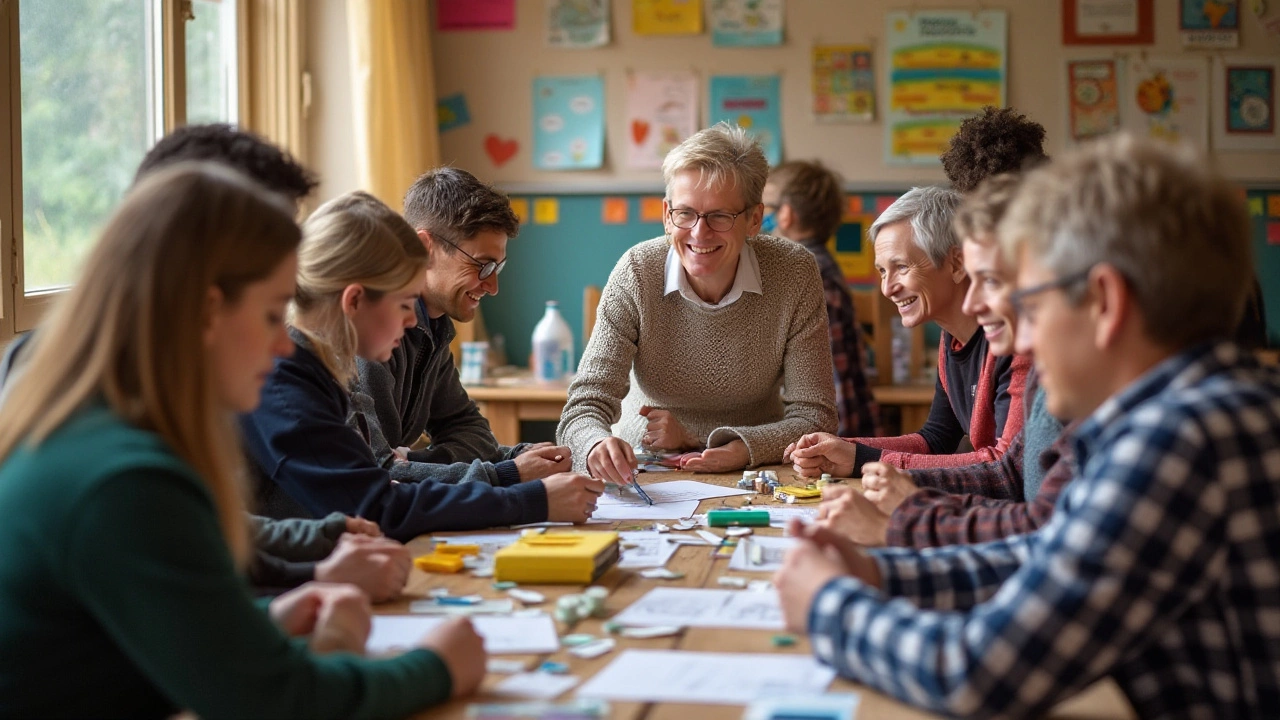Adult learning is a fascinating and complex domain that is more relevant today than ever. As we move through our lives, learning never truly stops; it evolves and adapts to fit our changing circumstances and needs. This evolution is framed within three primary contexts: formal, non-formal, and informal learning. Each offers unique opportunities for growth and skill development.
Formal learning is often easy to identify. Imagine university classrooms, structured programs, diplomas, and certifications. However, adult education transcends these traditional boundaries. Non-formal education takes shape in workshops, seminars, or even online courses - environments where learning is structured but not leading to official certifications. Then there is the vast expanse of informal learning; think about the skills picked up via everyday interactions, experiences, or the knowledge shared over a casual chat with friends.
Understanding these contexts can be a game-changer for both learners and educators. By recognizing how adults learn best in varying settings, programs can be tailored to meet specific needs and preferences. In adult education, a one-size-fits-all approach simply doesn't fit. Embracing the diversity of learning styles and settings ensures a richer, more fulfilling journey of lifelong learning.
- Understanding Formal Learning
- The Role of Non-Formal Education
- Unveiling Informal Learning
- Integrating Learning Contexts
- Practical Tips for Adult Learners
Understanding Formal Learning
Formal learning, often the first thing that comes to mind when thinking about education, is characterized by its structured and organized nature. It's what many of us grew up experiencing in school systems, and it continues into higher education levels like universities and colleges. This context of learning is defined by a clear and systematic educational framework, where courses are scheduled, materials are standardized, and assessments are in place to gauge progress and understanding.
In a typical formal learning environment, such as a university, the curriculum is crafted by experts in specific fields to ensure that students receive a comprehensive understanding of the subject matter. These programs often culminate in degrees or certifications that are recognized as qualifications for employment in various industries. According to the National Center for Education Statistics, in the United States alone, more than 19 million students were enrolled in degree-granting postsecondary institutions as of 2022, showcasing the significant role formal learning plays in shaping professional futures.
Within formal learning, there are several components that are integral to its structure, including scheduled classes, experienced instructors, textbooks, and a host of other educational resources. A unique aspect of this learning context is the formalized assessment methods, such as exams, quizzes, and assignments, which are used to measure student performance and understanding systematically. These measures ensure that learning objectives are met, and they provide students with feedback that is essential for their academic growth.
Research indicates that the social aspect of formal learning cannot be overlooked. Being in a classroom setting allows students to engage with peers, fostering a community of learners who can collaborate and share knowledge. This interaction is critical; Albert Bandura, a renowned psychologist, highlighted the importance of social learning, stating, "Most learning takes place through observing others."
Education is what remains after one has forgotten what one has learned in school." - Albert EinsteinThe interaction with peers and educators contributes significantly to the development of social skills and networks, which can be valuable in professional settings.
Another important feature of formal learning is its role in personal development. Through exposure to a variety of subjects and disciplines, students develop critical thinking skills, the ability to analyze complex information, and the capacity to solve problems creatively. These skills are undeniably important in our rapidly changing world, making formal learning an essential step in preparing individuals for the challenges of adult life. Additionally, formal education often instills a sense of discipline and responsibility, as students must adhere to deadlines and meet the rigorous demands of structured academic environments.
As the world of education evolves, so too does formal learning. Today, institutions are increasingly integrating technology into their curriculums, offering online courses and digital resources that complement traditional classroom instruction. This blend of traditional and modern approaches helps to accommodate varying learning styles and preferences, ensuring that formal learning remains relevant in an ever-changing educational landscape. This adaptation is crucial as it responds to the diverse needs of adult learners, many of whom juggle work, family, and their educational pursuits.
The Role of Non-Formal Education
Stepping beyond the traditional walls of a formal classroom, non-formal education plays a vital role in the lifelong learning journey of adults. It embodies flexibility, customization, and accessibility—key elements that cater to a diverse range of adult learning needs and preferences. Non-formal education encompasses a broad spectrum of learning practices, including workshops, online courses, seminars, adult education classes, and community-based training programs. These learning environments provide structured yet flexible settings that do not necessarily result in formal qualifications, but are incredibly valuable in enhancing skill sets, boosting employability, and fostering personal development.
More than just filling a gap left by formal education, non-formal learning allows individuals to target specific interests or skills they wish to develop. The content and pace of non-formal programs can be tailored to meet individual requirements, which makes them especially appealing for adults who juggle multiple responsibilities such as work, family, and continuing education. With the digital age ushering in new possibilities, online platforms offer an impressive assortment of courses from institutions around the world, allowing learners to access quality content from the comfort of their homes. This flexibility is invaluable for those unable to commit to a rigid schedule.
One fascinating aspect of non-formal education is its emphasis on participatory learning. Participants often engage in hands-on activities and interactive discussions, enhancing the absorption of knowledge through practical application. This method is particularly effective in teaching soft skills such as communication, teamwork, and problem-solving, which are highly sought after in the modern workplace. Due to this participatory nature, non-formal education is often heralded for fostering a learning environment that provokes critical thinking and encourages innovation.
Moreover, non-formal education thrives on community involvement. Many programs are designed to address local needs, and they empower communities by building capacity and resilience. This connection to real-world contexts makes the learning relevant and applicable.
“Education is the most powerful weapon which you can use to change the world,” said Nelson Mandela, highlighting the transformative power that non-formal learning can hold, especially when rooted in community strengths and needs.In recent years, the recognition of non-formal education's impact has led to increased support from governments and organizations aiming to upskill their populations in a rapidly evolving job market.
Adapting to new circumstances and challenges, non-formal education provides pathways for those seeking career changes or new opportunities. It's an arena ripe for experimentation and innovation, where educators can employ varied methodologies to engage learners creatively. This freedom to explore different teaching methods enhances the learning experience and makes education more inclusive. Surveys suggest that participants in non-formal learning contexts not only acquire new skills but also report increased self-confidence and motivation to continue their educational pursuits. Given its expansive impact, non-formal education stands as a cornerstone of the adult learning landscape, demonstrating how alternative educational pathways can enrich and transform lives.

Unveiling Informal Learning
Informal learning sits quietly yet powerfully in the backdrop of our lives, shaping us in subtle and profound ways. Unlike structured forms of education, informal learning isn't bound by class schedules or curriculums. It's naturally embedded in our everyday interactions and experiences, making it a lifelong journey that often goes unnoticed. Consider a scenario where someone is learning how to cook a new dish by following instinct, watching family traditions, or even taking a tip from a friend's shared recipe. These are examples of everyday experiences that unknowingly add to the vast pool of an individual’s knowledge without any formal acknowledgment.
This form of learning is remarkably adaptive. It thrives in environments where curiosity is the driver, and exploration is the key to understanding. Informal learning can be sparked by mundane tasks such as reading a book out of sheer interest, participating in a discussion with peers, or even through digital means like browsing forums and watching online tutorials. In this digital age, it’s interesting to see how platforms like YouTube, which offers a plethora of tutorials on diverse topics, have become pivotal in adults’ informal learning endeavors. This accessibility ensures that learning is always just a click away.
Informal learning's impact is backed by numerous studies. The internet's role as a facilitator cannot be overstated, offering endless resources and fostering communities where knowledge is shared freely. For example, a self-taught musician who learned through online videos and community feedback exemplifies how powerful informal learning can be. According to the Pew Research Center, a whopping 73% of adults in the U.S. engage in some form of personal learning, with a large part being carried out via informal means.
"Informal learning is like breathing; we do it constantly without even realizing it's happening," notes Etienne Wenger, a well-respected scholar in the field of social learning theory.
The flexibility and self-directed nature of informal learning make it particularly appealing. There's no formal setting, no deadlines to meet, and, importantly, no pressure other than the individual's own drive to learn. This can lead to a more profound and enjoyable learning experience, free from constraints. Individuals can learn at their own pace, re-examine topics as needed, and personalize their learning journey. Many experts argue that this form of learning fosters a deeper sense of engagement and motivation among adults.
In cases where adults return to more formal educational paths, their informal learning experiences contribute significantly. The knowledge and skills acquired informally often complement and enrich formal education. Consider a professional who learns a new language informally while living abroad. This added skill is undoubtedly a valuable asset in an ever-globalizing job market.
Informal learning, with its limitless potential, reminds us that education is not restricted to classrooms. It's a reminder that our most valuable lessons often happen in the spaces between structured settings, in moments of reflection, interaction, and experimentation. As such, embracing informal learning is vital to genuinely fostering a culture of lifelong education.
Integrating Learning Contexts
In the rich tapestry of adult learning, integrating formal, non-formal, and informal contexts can significantly enhance the educational landscape. At first glance, each of these contexts seems to operate in isolation, but life rarely adheres to such neat divisions. Our experiences are not compartmentalized; they blend and intersect, influencing how learning is absorbed and applied. To illustrate, consider a professional enrolled in a formal business management program. Alongside, they might engage in non-formal learning through industry-related workshops and simultaneously gather insights through informal conversations with peers. This intertwined approach not only deepens understanding but also provides a more holistic grasp of the subject matter.
By effectively combining these contexts, adult learners can harness a comprehensive learning experience. It starts with recognizing the value inherent in each approach. Formal education supports them with theory and foundational knowledge, while non-formal settings allow application and experimentation in a less restrictive environment. Informal learning supports the absorption of both through contextual real-world applications. A survey conducted by the National Center for Education Statistics illustrates that adults who blend various learning contexts report higher satisfaction rates in their educational pursuits, emphasizing the intrinsic value of integration.
Integration also encourages adaptability, a quality that is increasingly essential in today's dynamic world. As technology evolves, so do learning environments. Online platforms and digital tools blend these contexts seamlessly, offering modules that provide structured learning akin to formal settings, paired with interactive sessions that mimic the casual, flexible nature of informal learning. Lifelong learning becomes a more attainable goal when these contexts are intentionally intertwined.
Educators, therefore, play a crucial role in fostering this integration. They can design programs that push learners to apply classroom-acquired knowledge in real-world settings, encouraged by both structured courses and self-discovery paths. For instance, in a tech course, an educator might encourage students to participate in hackathons—a beautiful blend of formal and non-formal learning. Here, one learns technical skills through structured classes and immediately tests these in an unstructured competitive environment where informal interactions lead to breakthroughs.
Dr. John Dewey wisely noted,
"Education is not preparation for life; education is life itself."This notion beautifully encapsulates how an integrated learning approach can transform adult educational experiences into something that resonates deeply and personally throughout their lives. Encouraging such a blend can really make learning not just an event but an evolving journey—constantly refreshed by new insights, skills, and interactions from all life's corners. As we strive to build more effective educational models, recognizing and fostering this integrative potential is key to unlocking a learner's full potential.

Practical Tips for Adult Learners
Learning as an adult presents its own unique set of challenges and opportunities. With diverse responsibilities ranging from careers to family, adults often have to juggle various commitments while pursuing education. Yet, this multifaceted life experience can actually bolster the learning process, offering context and application for new knowledge. One critical tip for adult learners is to embrace their personal and professional experiences. When tackling new topics, try to relate them to familiar situations or problems you've encountered in the workplace or at home. This not only aids understanding but also makes the information stick longer in your mind.
Another useful strategy is to set clear, actionable goals. Having a tangible objective, whether it's earning a specific certification or mastering a new skill, provides a direction and helps maintain focus amidst distractions. Break down these goals into smaller, manageable tasks. Creating a study schedule that fits into your life can make learning less overwhelming. Whether it's 30 minutes a day or an hour three times a week, consistency is key. Remember to establish a dedicated learning space, if possible. A space that signals ‘it’s learning time’ can significantly boost productivity and concentration. Shifting between learning modes also enhances retention, so explore different resources such as books, videos, and online forums.
Don't underestimate the power of leveraging your network. Reach out to peers, join study groups, or participate in online communities related to your fields of interest. Engaging with others offers insights, feedback, and moral support. Often, teaching others what you've learned can reinforce your own understanding, making peer interactions a powerful tool for knowledge reinforcement. Don't shy away from seeking assistance; teachers, mentors, and colleagues can provide valuable help and guidance.
"Tell me and I forget, teach me and I may remember, involve me and I learn," Benjamin Franklin famously noted. Involvement and interaction can be your guide.
As much as progress is critical, keeping yourself motivated is equally important. Celebrate small victories along the way, such as completing a chapter or acing a quiz. These little celebrations can boost your morale and sustain motivation throughout your learning journey. Don't forget to practice self-care. Balancing learning with daily life requires being mentally and emotionally fit. Regular breaks, exercise, and even meditation can help clear the mind and boost cognitive function. Remember, your brain is a muscle; it needs rest and revitalization to perform its best.
For those who like data-driven approaches, journaling your progress and noting which strategies work best for you can be revealing. Visualizing how far you've come can be a powerful motivator. A simple log chart mapping your learning milestones over time can provide a visual sense of accomplishment and areas needing improvement. In this journey of lifelong learning, adapt and modify your methods as needed. Adult education is as much about personal growth as it is about acquiring knowledge.
